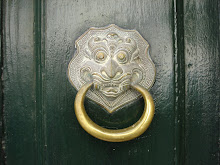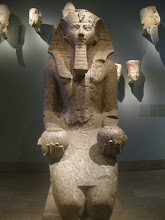I finally managed to get a hold of some books on the PLO and the wars that Palestinian freedom fighters and revolutionaries have fought in. Have lots to read.
When I say lots, I mean lots. I have Robert Fisk's Pity the Nation about the Lebanon wars (nobody told me it was 727 pages!) and The Great War for Civilization for a general overview of the region (I did know it was kind of dense... 1368 pages--what was I thinking?); and Arafat and the Dream of Palestine by Bassam Abu Sharif (a slim 260 pages-- I suppose former freedom fighters/terrorists don't waste words the way journalists do).
Arafat and the dream of Palestine.
Did I tell you that Tarek's Mom gave me a small embroidered pouch made from a traditional Palestinian dress that Abu Ammar (also known as Yasser Arafat) gave her years and years back? She cut up that dress recently to make a new, slightly more modern one (yes, I tried to talk her out of it, but somehow it didn't seem half as remarkable having been given a dress by Abu Ammar to her as it did to me), and had the pouch made for me.
Oh, and Tarek and I were invited for iftar at his neighbor's house and she told us about when she was 9 or 10 and lived in the old city of Nablus and Abu Ammar would come and hide at her house right after the 1967 war (her father was one of the town elders).
We never had historical figures hiding in our house when I grew up.

When I say lots, I mean lots. I have Robert Fisk's Pity the Nation about the Lebanon wars (nobody told me it was 727 pages!) and The Great War for Civilization for a general overview of the region (I did know it was kind of dense... 1368 pages--what was I thinking?); and Arafat and the Dream of Palestine by Bassam Abu Sharif (a slim 260 pages-- I suppose former freedom fighters/terrorists don't waste words the way journalists do).
Arafat and the dream of Palestine.
Did I tell you that Tarek's Mom gave me a small embroidered pouch made from a traditional Palestinian dress that Abu Ammar (also known as Yasser Arafat) gave her years and years back? She cut up that dress recently to make a new, slightly more modern one (yes, I tried to talk her out of it, but somehow it didn't seem half as remarkable having been given a dress by Abu Ammar to her as it did to me), and had the pouch made for me.
Oh, and Tarek and I were invited for iftar at his neighbor's house and she told us about when she was 9 or 10 and lived in the old city of Nablus and Abu Ammar would come and hide at her house right after the 1967 war (her father was one of the town elders).
We never had historical figures hiding in our house when I grew up.





















